We’ve got some great news for our industry… NFA paperwork processing times from the ATF have dropped significantly from years past. We have even better news for you if you already have your FFL: this is likely to encourage more customers to buy NFA firearms (like silencers, short barreled rifles, and more) from you! […]
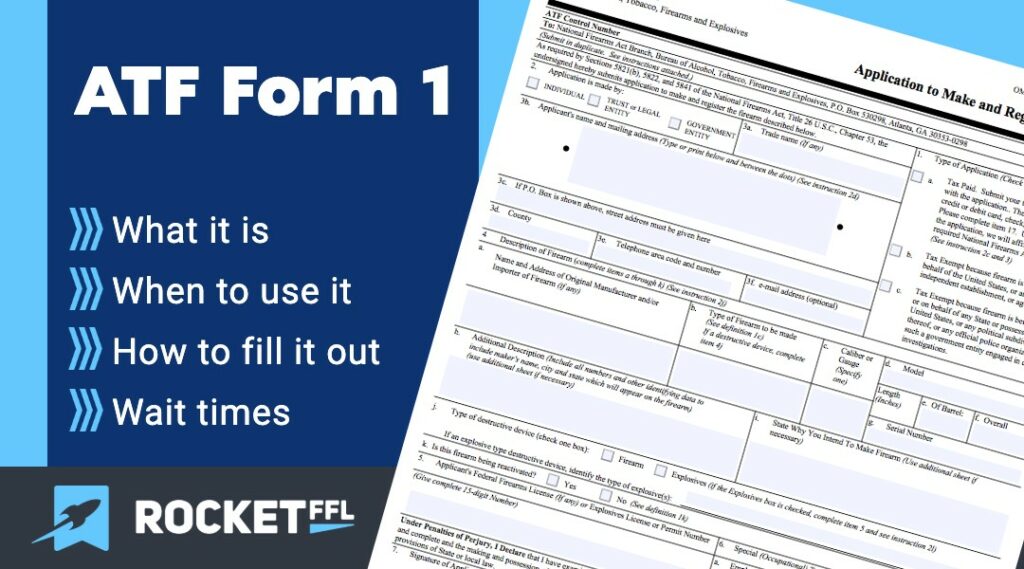
ATF Form 1 – Everything You Need to Know
If you’re looking for information on the ATF Form 1, then that means you’re considering making an NFA firearm like a short barreled rifle (SBR), short barreled shotgun (SBS), or even maybe your own suppressor (silencer) and you want to make sure you’re doing it the right way.
I’m here to help by breaking down everything you need to know about the Form 1. Why should you trust the information you get here? Simple, I’m a firearms attorney who has helped hundreds of clients, from the biggest firearms manufactures to the smallest home-based FFLs, and I’ve helped thousands of people get their FFL and fill out their own ATF Forms.
In this article, we’re going to cover everything you need to know about the ATF Form 1 including what a Form 1 is, exactly how it should be used, and current wait times.
There’s also a better option that allows you to Make NFA Firearms whenever you want (without a wait for approval): have your own manufacturer’s FFL.
Table of contents
Types of firearms you can make at home with an ATF Form 1:
- Suppressor (silencer)
- Short Barreled Rifle (SBR)
- Short Barreled Shotgun (SBS)
- Any Other Weapons (AOWs)
What is an ATF Form 1?
ATF’s “Form 1” is actually ATF Form 5320.1. Each of the ATF “Forms” are all technically a version of Form 5320 with a different number after the decimal point.
The number after the decimal point is where each form gets its nickname – “Form 1” is 5320.1, “Form 2” is 5320.2, and so on.
ATF Form 1 is an “Application to Make and Register a Firearm.” It is used whenever a person without a Federal Firearms License (FFL) wants to make an “NFA Firearm” such as a silencer (suppressor), short barreled rifle (SBR), short barreled shotgun (SBS), or an Any Other Weapon (AOW).
You may have noticed that I left a type of NFA item off of that list – machine gun. That is because machine guns made after 1986 may only be made by Federal Firearm Licenses with a Type 7 FFL, who are also a Class 2 SOT. Want to get an FFL and become an SOT? Sign up for our Get Your FFL and/or our Become an SOT guides!
The ATF Form 1 is an application – this means that it is sent in to the ATF as a request for permission. The ATF Form 2, on the other hand, which is used by FFL manufacturers, is a notification form – it is not an application for permission and is sent in by the FFL after the NFA item has been made.
When to use a Form 1
Remember, because this form is submitted to the ATF by a non-FFL and it is an application for permission, it must be approved BEFORE the NFA firearm can be made.
If you used our guides and got your FFL and became an SOT, you can make the NFA firearm first and then simply submit a Form 2 afterwards which simply notifies the ATF that you made the NFA firearm – no “permission” is required for an FFL!
A non-FFL fills out the ATF Form 1, submits it along with a check for either $200 or $5 (depending on the firearm that is going to be made), and waits for approval.
Yes, that means that a non-FFL (an ordinary citizen) can legally (under federal law) make their own NFA firearm (silencer/suppressor, short barreled rifle, short barreled shotgun, or any other weapon) at their home!
NOTE: this is federal law only – certain states may prohibit this activity.
It takes a few months for the ATF to approve a Form 1.
ATF Form 1 Exemption
If you’d like to avoid the multi-month wait time for approval, and the tax you’ll have to pay per firearm (this is not a tax exempt transfer) you should seriously consider getting an FFL.
A type 07 FFL, who is also an SOT, doesn’t even need approval before legally making NFA Firearms.
Note, the FFL type is important! A type 1 FFL can NOT Make NFA Firearms.
Form 1 Suppressor
A Form 1 Suppressor is a suppressor, or silencer, that someone makes at home after receiving an approved Form 1 back from the ATF.
A suppressor is one of the hardest NFA Firearms to make at home with a Form 1. This is because some level of machining is typically involved.
There are companies that sell kits, sometimes called “solvent traps,” that are intended to allow people to make their own Form 1 suppressor. We strongly recommend you avoid these, no matter how tempting they seem. This is because the legality of these items is suspect.
Unlike other kits to make your own firearms like “80% receivers,” suppressors are not like standard firearms. When it comes to standard firearms, the only part, by itself, that is a firearm is the frame or receiver. And, as long as the part that might become a frame or receiver has not yet crossed the “readily convertible” line, then it isn’t a firearm.
However, with suppressors (or, as I refer to them, silencers), EVERY part of a silencer is a silencer. And, any part designed and intended to be a part of a silencer IS a silencer.
Therefore, these “solvent trap” parts, because they are designed and intended to be silencers, are arguably silencer parts and therefore suppressors or silencers. Using the same logic from “80% firearms” with suppressors is dangerous.
Obviously, be very careful if you don’t have an FFL and you’re looking to make your own NFA Firearms.
As a general rule with Form 1 suppressors, as well as any other Form 1 firearm, do NOT have the parts to make the firearm until you have an approved Form 1 from the ATF. Mere possession of all the parts, even though they may not yet be assembled, can be considered “constructive possession” by the ATF.
Steps to Form 1 a Suppressor:
- Fill out and submit your Form 1
- Receive approved Form 1 from ATF
- Acquire parts to make suppressor
- Make suppressor
Form 1 Short Barreled Rifle
If you’d like to make your own short barreled rifle (SBR) and you don’t have an FFL, you can legally (under federal law) make one after you receive your approved Form 1 back from the ATF.
Under federal law, a standard rifle has a barrel length of at least 16″ and an overall length of at least 26″. If a rifle has a shorter overall length or barrel, it is considered a “short-barreled rifle” and it is an NFA Firearm.
If you’d like to make an SBR, do NOT have the short barrel in your possession prior to having an approved Form 1 for the SBR. Keeping the short barrel at a friend’s house, or even at your local gun shop, is a good idea.
Once your Form 1 comes back from the ATF, you can assemble (or make) your short barreled rifle (SBR).
Form 1 Short Barreled Shotgun
To make a short barreled shotgun with a Form 1, the guidance is very similar to the info for a short barreled rifle above.
The only difference is the barrel length requirement. For shotguns, the barrel must be at least 18″ long to not be considered a short barreled shotgun.
How to Fill Out a Form 1 (Paper Version)
There are two ways to apply to make an NFA Firearm with the ATF and get your tax stamp. You can either:
- Fill out the paper version of the Form 1 (the NFA form you need to use) and apply manually (this is what we’re covering in this section) or,
- eFile using the ATF’s eForm system (we’ll cover this next).
Here’s how to fill out the paper form of ATF’s Form 1:
- Chose the tax status of your application. If you are making this firearm for yourself, select “a. Tax Paid.”
- Select who/what is making the application. Are you planning to make the NFA firearm as an individual or as a representative of an NFA gun trust or company/corporation? If as an individual, skip questions 15 and 16. If as a trust or company/corporation, skip questions 11, 12, 13, and 14.
- You need an actual address where the ATF can come and visit and see the NFA firearm if they choose to. If you use a P.O. Box in 3b., then you’ll need to add your physical address in 3c.
- Enter the description of what the firearm / NFA weapon will be after you receive approval (this includes serial number, caliber, overall length, etc), and after you make it. Be very careful getting some of these measurements. For example, if you put a short barreled upper receiver of an AR-15-style firearm onto the lower to take some measurements, you just unlawfully manufactured a short barreled rifle because the ATF Form 1 has not been approved yet! Also, just having the parts available to easily assemble is a problem – the ATF will see this as “constructive possession” and it is just as bad as having the firearm actually assembled. You should store the NFA-specific parts with your local FFL until the ATF Form 1 is approved, so that you don’t have all the parts at your house. Or, use our Get Your FFL and/or our Become an SOT guides, and then you don’t have to deal with this hassle!
- Most likely, if you are using an ATF Form 1, you don’t have an FFL, so you should put “N/A” here.
- Most likely, if you are using an ATF Form 1, you aren’t an SOT, so you should put “N/A” here.
- Sign.
- Print your name (and title if filing out for a trust or a company/corporation).
- Date.
- You must notify your local law enforcement office – approval from them is not required. Enter the agency, officer’s name, and address here.
- For individuals only (not legal entity): Answer the questions and attach details for any “yes” answers on a separate sheet, which should be attached and submitted to the ATF along with your Form 1 application.
- For individuals only: Attach a recent passport photograph (take the time to make this look professional).
- For individuals only: Answer the questions.
- For individuals only: Include your applicable number or enter “N/A” if it doesn’t apply.
- For entities only: List the number of “Responsible Persons”
- For entities only: List each “Responsible Person”. An ATF Form 5310.12a / Form 7 – Part B / Responsible Person Questionnaire must be completed by each Responsible Person and submitted along with the Form 1 application.
- Enter your method of payment. If you use a check, you can see when it was cashed to help track your Form 1 progress, and you don’t need to use the second copy of the form in the document to hide your credit card information from the law enforcement agency.
Submit the following ATF Form 1 Application to:
National Firearms Act Division
Bureau of Alcohol, Tobacco, Firearms and Explosives
P.O. Box 5015
Portland, OR 97208-5015
- TWO COPIES of your completed ATF Form 1
- Passport photo
- Fingerprint cards on FBI Form FD-258
- ATF Form 5310.12a / Form 7 – Part B (if applicable)
- Extra info for “yes” answers to Section 11 (if applicable)
- Check for $200 for all NFA firearms made. (AOWs are only $5 for transfers)
Don’t forget to send a copy of your ATF Form 1 to your local law enforcement agency and make sure you are using the right fingerprint card.
ATF Form 1 eFile
You can eFile a Form 1 with the ATF through the ATF’s eForm system.
If you haven’t yet, you’ll need to register for the eForms system and then start the Form 1 application process. You can register for the eForm system by following these instructions:
Access the eForms Registration/Log In screen at www.atfonline.gov/, then click on eForms. Fill in the information that is requested on the screen. As soon as your first and last name are entered on the Registration screen, your User ID will be generated, on the right side of the screen. We suggest that you write the User ID down for your future reference (as well as note the password you establish).
After the registration is completed and submitted, an email will be sent to the email address you provided containing the User ID and a thank-you message. If you are a Federal Firearms Licensee (FFL) or an Arms Export Control Act (AECA) registrant, before you can submit forms for the company, you must log into eForms and click on the MY PROFILE tab to request to be associated with your FFL(s) or AECA number(s).
If you’d like help with the eForm system for eFiling your Form 1, please refer to the ATF eForm Instructions. You can also check out the ATF website.
ATF Form 1 Wait Times
Currently, the ATF Form 1 SBR wait time is 29 days for an eForm and 48 days for a paper Form 1.
Form 1 wait times for silencers and SBS are similar but a few days longer.
The good news is that approval times for a Form 1 are almost always faster than an ATF Form 4. This means that between the two NFA applications, it is faster to make your own SBR on a Form 1 than it is to buy an SBR on a Form 4.
However, it is WAYYYY faster (and you can avoid this hassle) if you Get Your FFL and/or our Become an SOT! With a Type 7 FFL and by being a Class 2 SOT, you can make an NFA firearm whenever you want (even machine guns) and simply notify the NFA division of the ATF after you’re done – no permission required!
I hope this helps you understand more about the ATF Form 1, and the ATF Form 1 wait time – if you have any questions, don’t hesitate to reach out and ask!

ATF Form 1 FAQ
ATF’s Form 1 is the application for individuals (non-FFLs) to legally manufacture their own NFA Firearms.
A Form 1 is filed with the ATF before the NFA Firearm is made – it is approval to start making an NFA Firearm. If you’d like to make NFA Firearms without prior approval, you should get an FFL.
The approval process for a Form 1 is anywhere from a few days to a few months, depending on whether the Form 1 was filed electronically or by paper. A form 1 filed electronically is typically approved in a few days, whereas a Form 1 application by paper is typically a few months.
You can eFile a Form 1 through the ATF’s eForm system.
The newest version of the Form 1 (since 2019) needs to be mailed to the new ATF address for Form 1s: National Firearms Act Division, Bureau of Alcohol, Tobacco, Firearms and Explosives, P.O. Box 5015 Portland, OR 97208-5015
Recommended Posts

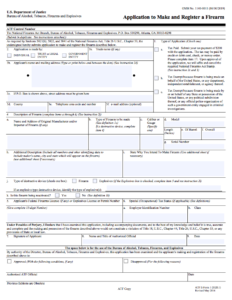
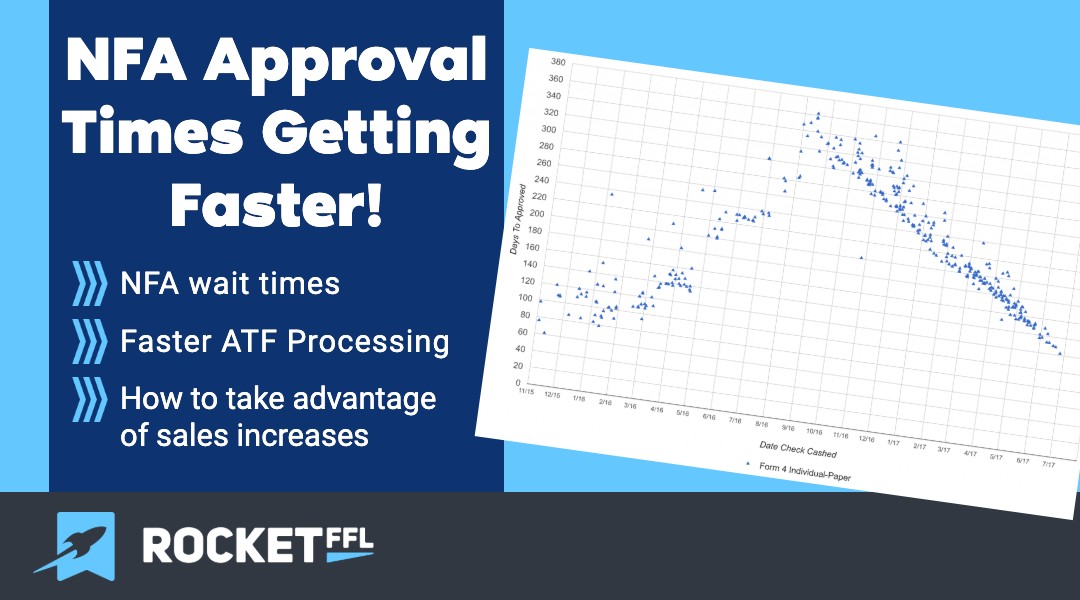
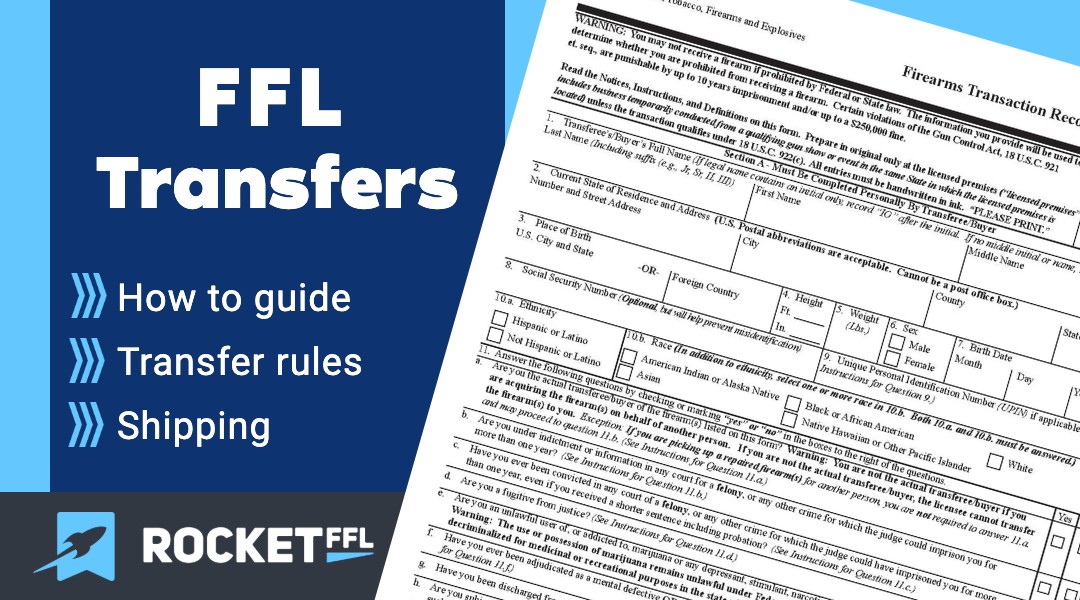
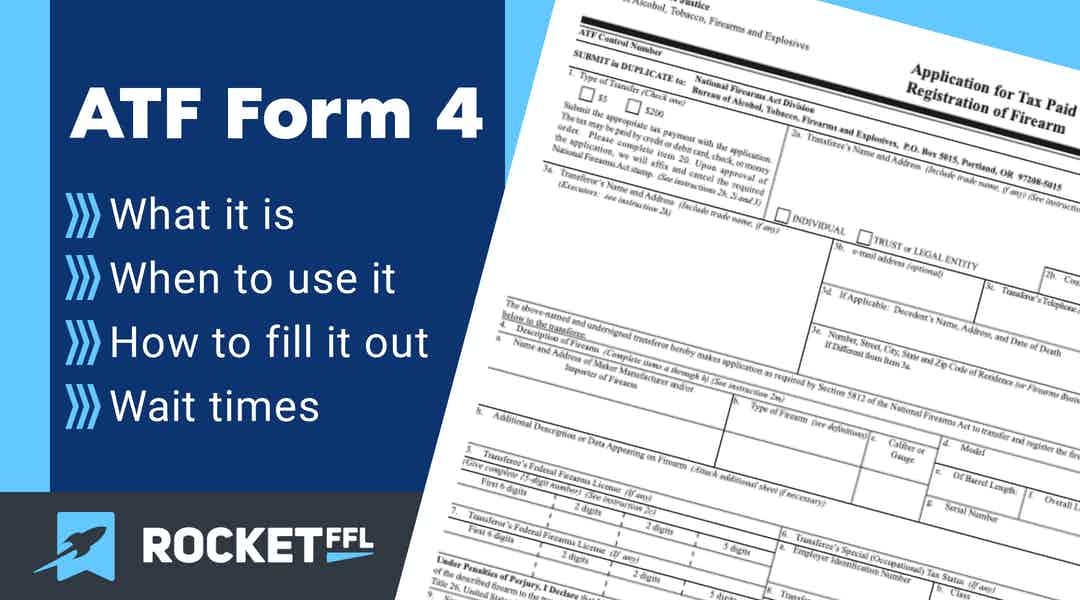
Want to change a Daniel Defense Pistol into SBR.